032216_YKBP_A2.pdf







2 Broadcaster Press
Hungry for Truth Celebrates
National Ag Day
SIOUX FALLS – This week marks the
43rd annual National Agriculture Week,
a celebration of agriculture’s contributions to the lives of everyday Americans. Today, more than ever, people are
making connections between the food
on their plates and the farm it came
from, wanting to know more about how
it was raised and what that means for
their families, the environment and the
economy.
According to 2015 research by the
Center for Food Integrity, 70 percent of
U.S. consumers are concerned about
the rising cost of food; 62 percent
are concerned about food safety; 53
percent are concerned about having
enough food to feed the U.S.; and 47
percent are concerned about the humane treatment of farm animals.
What do South Dakotans care about
when it comes to food and farming?
In an effort to facilitate genuine connections between South Dakotans and
the farmers who grow their food, the
South Dakota Soybean Research and
Promotion Council (SDSRPC) launched
the Hungry for Truth initiative a little
over a year ago. As part of the group’s
goals to quantify the opinions of South
Dakotans, SDSRPC leaders contracted
with an independent global research
organization, Aimpoint Research, to determine what concerns South Dakotans
most about food and farming.
What Aimpoint found was enlightening. According to research conducted
last spring, when thinking about agriculture, 47 percent of South Dakotans
rank healthy food as most important;
21 percent say low-cost food is most
important to them; 17 percent were
most concerned about protection of the
environment; and 10 percent place the
most value on animal welfare.
When thinking about the food they
eat and the things that concern them
the most, 45 percent of South Dakotans
cited use of pesticides and chemicals;
22 percent said use of antibiotics and
hormones; and 18 percent said use of
genetically modified organisms (GMOs).
“Overall, the concerns of South
Dakotans seem on par with national
concerns. Knowing this, we want to
be there for South Dakotans to answer
our neighbors’ questions about farming,” said Marc Reiner, farmer from
Tripp and SDSRPC chairman. “That’s
precisely why the South Dakota Soybean Research and Promotion Council
launched Hungry for Truth last year: To
open up conversations about food and
farming and, we hope, answer the questions our state’s residents have about
where their food comes from.”
The Hungry for Truth initiative is to
have open and honest conversations
between farmers and fellow South Dakotans about food and farming. Hungry
for Truth launched in January 2015 and
immediately began connecting with
South Dakotans through events, social
media and advertising.
“A little more than a year into the
effort, the questions and resulting
conversations have been extremely enlightening,” Reiner said. Several of the
farmers behind Hungry for Truth cited
their most memorable conversations.
The cost of organic foods
For Jerry Schmitz, Vermillion farmer
and South Dakota Soybean Association
president, a conversation with a young
mother is one of his most memorable.
Schmitz said the woman wanted to feed
her kids organic food because she’d
heard it was healthier, but that it was
too expensive for her to afford. She
asked Schmitz how she can make sure
her kids are getting the healthiest food
possible.
“A young mother approached me
with this question, and I explained that
all foods in our grocery stores, no matter the growing practice, are safe and
healthy,” Schmitz said. “Organic really
refers to the way a product is grown,
not a product’s health or nutritional
value. Whether food is raised organically or conventionally, they both offer
the same nutritional value.” According
to a study published in the Annals of
Internal Medicine, organic and conventionally raised foods are equally
nutritious.
GMOs – OMG?
According to John Horter, Andover
farmer and South Dakota Soybean Association treasurer, everyone is buzzing
about GMOs. He said that because
most people don’t know exactly what
biotechnology is, they are concerned
about the safety of GMO foods and
crops.
“Biotechnology is simply a more
precise way of breeding crops. They are
bred for desirable traits like resistance
to insects or disease that help farmers like me produce crops with fewer
inputs, like pesticides,” said Horter. “As
far as their safety, we’ve been growing GMO crops for more than 20 years
and not one health issue has ever been
reported. On average, these crops
go through 13 years of testing by the
FDA, USDA and EPA before they are
approved for farming. As a father and a
fifth-generation farmer, knowing these
facts makes me confident that what I’m
growing is safe for me and my family."
Back to the way things were
Schmitz has heard the call, especially from young people, to return to
the way things used to be in farming:
a small operation, no pesticides or big
machinery, with a diversity of livestock
and crops. Though this sounds idyllic, he explained that the technology
farmers use today makes them more
efficient and environmentally friendly
than in the past.
“Our ancestors used a plow and cultivators to control weeds that rob moisture and nutrients from crops because
that was their only option,” Schmitz
said. “Today, science and technology
offer farmers lots of different options to
choose from, and it’s up to the farmer
to choose the best practices based on
the soil characteristics of each field
they farm. One technology that’s had a
huge impact on how I farm is GPS. GPS
technology has done more than help
give directions around town. Today, I
use GPS to map fields into garden-sized
plots for soil sampling and fertilization so that each small area receives
the exact prescription of nutrients the
plants require.”
In 2016, Hungry for Truth will
continue the goal of connecting South
Dakotans to the farm. Look for Hungry
for Truth at the Sioux Empire Fair in
August and the Great Downtown Pumpkin Festival in Rapid City this fall, or
even on the big screen, with farm trivia
before movies at your local theater.
“Year one was about creating awareness of the initiative,” said Schmitz. “We
talked to so many South Dakotans. During year two, we’ll use what we heard
about what is most important to the
people of our state when it comes to
food and farming, and dive even deeper
into the issues. The great thing about
Hungry for Truth is that, as farmers, we
get to learn new things as well.”
The conversation continues
throughout the year on social media.
Look for Hungry for Truth SD on Facebook, Twitter, Instagram and Pinterest.
To learn more about the Hungry for
Truth initiative, visit www.HungryForTruthSD.com.
USD Healthcare Careers Camp Registration Open
High school students interested in health care careers can
register now to attend the 10th
annual Healthcare Careers Summer Camp at the University of
South Dakota, June 19-24.
Students selected will participate in information-gathering
activities and receive handson learning, including a gross
anatomy lab tour, certification in
cardio pulmonary resuscitation
(CPR), field trips to area medical
facilities and group activities
and discussions. Additionally,
camp participants will interact
with health care professionals,
faculty and others relative to the
pursuit of careers in health care.
Applicants eligible to attend are
students entering 10th through
the 12th grades this fall. Staff
advisers from the Sanford School
of Medicine and the USD School
of Health Sciences will also be
available during the camp to discuss everything from education
requirements to future employment opportunities and salaries.
Sponsors for the 2016 Healthcare Careers Summer Camp are
the Sanford Vermillion Medical
Center, the Dakota Hospital
Foundation, Sanford School of
Medicine, the USD School of
Health Sciences, Sanford Health,
Delta Dental of South Dakota
Foundation and the 7th District
Medical Society. USD’s Healthcare
Careers Summer Camp is open
to students from South Dakota,
northeast Nebraska, northwest
Iowa and southwest Minnesota.
Tuition is $100 per student with
meals, lodging and all educational and recreational activities
provided. All applications require
a counselor nomination, a parent
or guardian signature, an official
school transcript and a personal
statement. Application deadline
is Friday, April 1 and details are
available at www.usd.edu/medicine/healthcare-careers-camp.
If
You Read This...
You Know
Advertising Pays!
Call the
Broadcaster at
605-624-4429
or stop by to
place your ad
today!
201 West Cherry St
Vermillion, SD
624-4429
March 22, 2016 www.broadcasteronline.com
School of Law Hosts Law
Review Symposium
The South Dakota Law Review will hold its annual symposium April 1 at the University of South Dakota School of
Law. This year’s topic is “Asset Protection and Trust Innovations: South Dakota’s Role in Paving the Way for Innovations
Nationwide.”
The symposium will be held in the law courtroom from
9 a.m. to approximately 5:30 p.m. on Friday, April 1. The
keynote speaker is Jay Adkisson, Riser Adkisson LLP, who has
written several books on the topic of asset protection, most
notably “Asset Protection: Concepts and Strategies for Protecting Your Wealth.” The event also features several other
prominent speakers.
The symposium is approved for continuing legal education
credit in both Nebraska and Iowa. Those attending are eligible
for up to four hours of continuing legal education.
The schedule of events (times are approximate):
9 a.m. -- Opening by Al King and Pierce McDowell, South
Dakota Trust Co.: History of asset protection and trusts in
South Dakota and nationally
10 a.m. -- Keynote by Jay Adkisson, Riser Adkisson LLP:
Charging orders
11:30 p.m. -- Break for lunch (on own)
1 p.m. -- Hot topics panel moderated by Dennis Collins,
Jewell, Collins & DeLay: Matthew Bock and Craig Krogstad,
Woods, Fuller, Schulz & Smith, directed trusts and special
purpose entities; Heath Oberloh, Linquist & Vennum, series
LLCs; Mary Akkerman, Linquist & Vennum, decanting; Terry
Prendergast, Redstone Law Firm, special spousal trusts
3:30 p.m. -- Asset protection panel moderated by Dennis
Collins, Jewell, Collins & DeLay: Matthew Van Heuvelen and
Mark Krogstad, Davenport, Evans, Hurwitz & Smith, domestic
asset protection trusts (DAPTs); Diane Klien, professor of
law at University of La Verne College of Law, ethical issues
with asset protection; Victoria Haneman, professor of law at
Concordia University School of Law; incentive trusts and impact RAP has in other states; Alice Rokahr, president, Trident
Trust Co. South Dakota, benefits and tax implications of U.S.
trusts for foreign settlors
USD School of Law students first produced the South
Dakota Law Review in 1956. They publish it three times a year
as a forum for materials and views on subjects of interest to
the legal profession.
Capitol Notebook
Solid Session For
Openness
BY BOB MERCER
State Capitol Bureau
PIERRE – The 2016 legislative session was historic in
advancing government transparency. Here are lawmakers who
led the progress.m Sen. Corey
Brown, R-Gettysburg, and Rep. Al
Novstrup, R-Aberdeen: State law
previously didn’t define a public
meeting. Now it’s “a quorum of
a public body at which official
business of that public body is
discussed or decided, or public
policy is formulated, whether in
person or by means of teleconference.” SB 73 also broadens
a teleconference meeting to
include the Internet. Rep. Lee
Schoenbeck, R-Watertown, and
Sen. Bernie Hunhoff, D-Yankton:
Schoenbeck isn’t running for
re-election but led a substantial
change on public meeting notices
for state government.
HB 1066 requires two intervening days, not counting the
day the notice is posted and not
counting the day of the meeting.
This replaces 24-hour notice for
state meetings. Rep. Dan Dryden,
R-Rapid City, and Sen. David
Novstrup, R-Aberdeen: This is
one of those obscure changes
that better protect taxpayers.
HB 1090 requires annual
audits of insurance pooling arrangements involving state
government or local governments
and school districts. The audited
financial statements must be
submitted to the state Department of Legislative Audit and
published on its website. The
new law also says state auditors
can examine the records. Rep.
G. Mark Mickelson, R-Sioux Falls,
and Sen. Deb Peters, R-Hartford:
Conflicts of interest would need
to be reported by members of
state boards, commissions and
authorities.
HB 1214 also applies to
board members, fiscal agents,
officers and executives for school
districts and other education
organizations that receive money
from or through state government. Rep. Michele Harrison,
R-Mobridge, and Sen. Corey
Brown, R-Gettysburg: Neither
is running for election but they
leave a substantial improvement
in the state legal code regarding
open meetings.
HB 1218 calls for a municipal governing board to take an
extra five days, and hold another
public meeting, before final
adoption, if a proposed ordinance
was “substantially” altered at the
second reading. Sen. Ried Holien,
R-Watertown, and Rep. Burt
Tulson, R-Lake Norden: With SB
90, a person can’t be prevented
from recording an open public
meeting so long as the recording
is “reasonable, obvious and not
disruptive.” Sen. Mike Vehle, RMitchell, and Rep. Scott Munsterman, R-Brookings: The Legislative
Planning Committee must review
each state agency at least once
every three years.
SB 143 also requires publication on a state website of six
performance measures for each
agency. Gov. Dennis Daugaard
and Lt. Gov. Matt Michels: They
established in state law the Board
of Internal Control to oversee
standards, conduct and conflicts
of interest within much of state
government, state universities
and state courts.
SB 162 also creates new standards for grant recipients and
requires grant agreements to be
published on a state website. It
also creates whistleblower provisions. But transparency would be
set back in SB 159. It would hide
identities of insurance companies
that receive state tax credits for
funding tuition subsidies to help
students attend non-public K-12
schools. Sponsors are Sen. Phyllis
Heineman, R-Sioux Falls, and Rep.
Brian Gosch, R-Rapid City. The
bill awaits a state Supreme Court
advisory opinion on the tax credit
and the governor’s subsequent
decision.
Enough secrecy, please.
90.97 Acres of Clay County Land
in Meckling Township
Monday April 11th, 9:30am
Located: 5 miles North of Meckling, SD on 457th Avenue, ¾-mile East on Bluff
Road (across from 30976 Bluff Road).
Clay County FSA Office shows 38.52 acres currently into row crop with the balance into grass and native grass cropland that could be broken and farmed.
Predominate soil types include Ja, Bm and Lu all 0 to 2% slope.
LEGAL: That portion of the E1/2 SE 1/4, lying South of Bluff Road in Sec 1,
that part of the NE1/4 NE1/4, lying North and East of the Clay Creek drainage
ditch in Sec 12 and that portion of the NW1/4 NE1/4 lying North and East of
the Clay Creek drainage ditch in Sec 12 all in Twp 93- Range 53, West of the 5th
PM, Clay County, SD.
Terms: 20% nonrefundable down payment due day of auction with balance due
on closing day of May 11, 2016. Full possession given day of auction with right
to farm in 2016. Seller will pay 2015 taxes due in 2016. Title insurance and
closing costs will be split 50/50 between buyer and seller. Gary Ward, Attorney,
Viborg, closing agent. Auctioneers are acting as agents of the seller.
Deanna Leikvold, Beresford,SD; Sharon Ferdig, Vancouver,WA;
& Edwin Anderson, Tucson, AZ, OWNERS
GIRARD AUCTION
& LAND BROKERS, INC.
(605) 267-2421
Toll Free: 1-866-531-6186
MARV GIRARD, BA; KEN GIRARD, CAI, AARE; MIKE GIRARD, CAI, BA; SCOTT MOORE, AUCTIONEER
www.GirardAuction.com



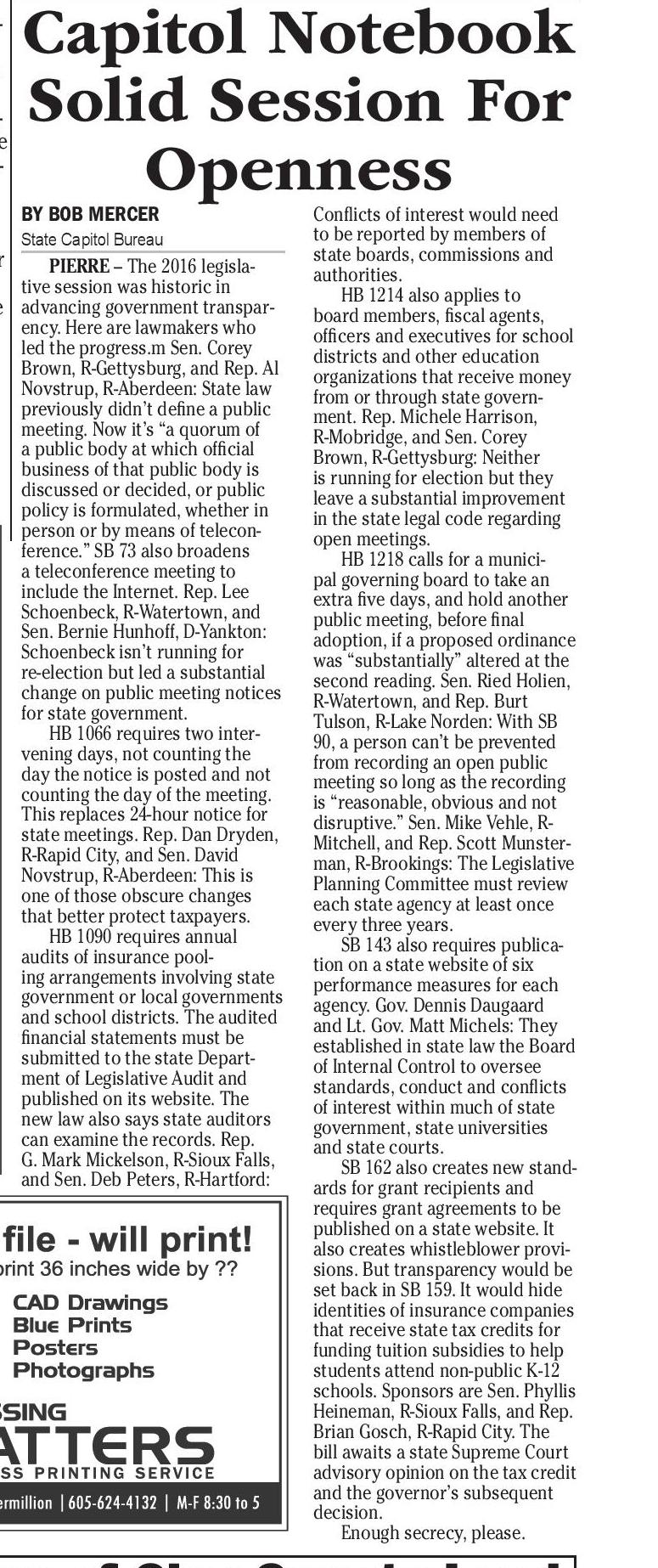

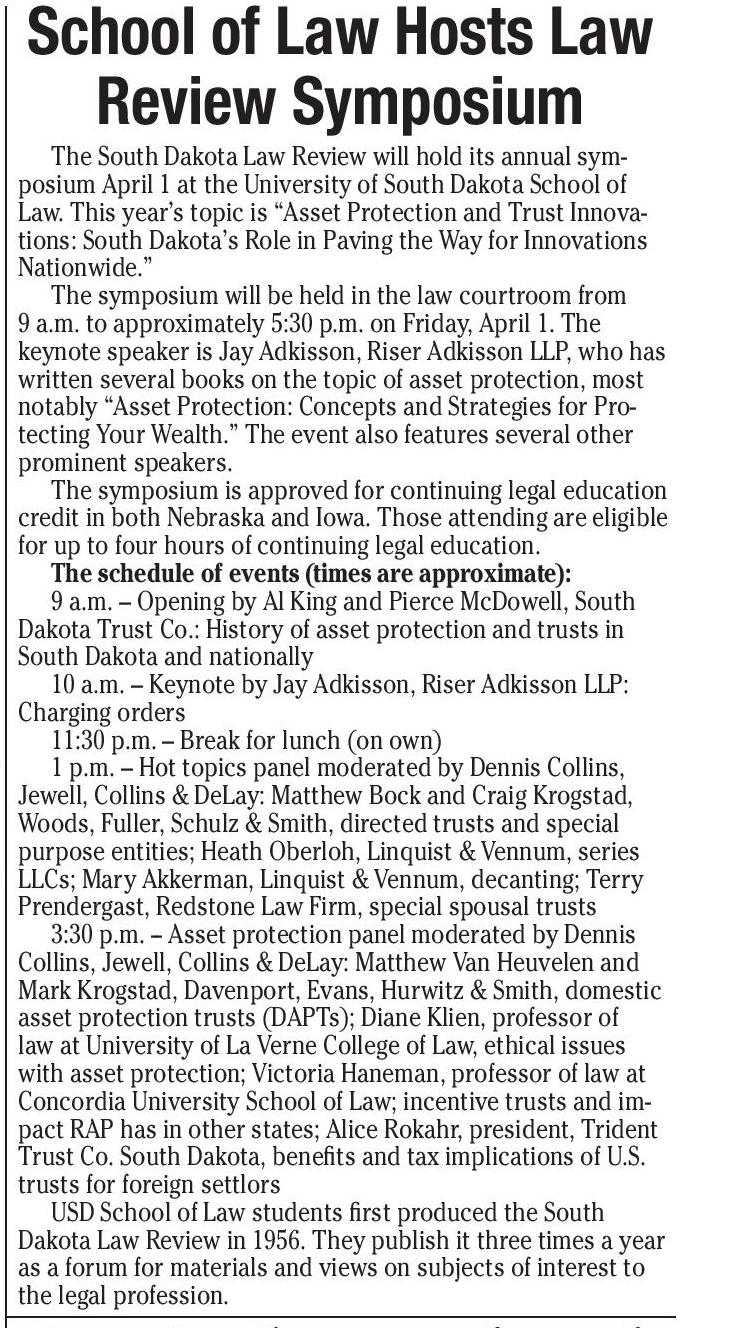



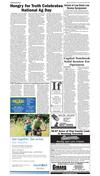

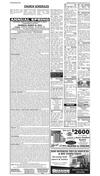
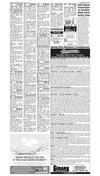



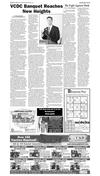



 Previous Page
Previous Page






